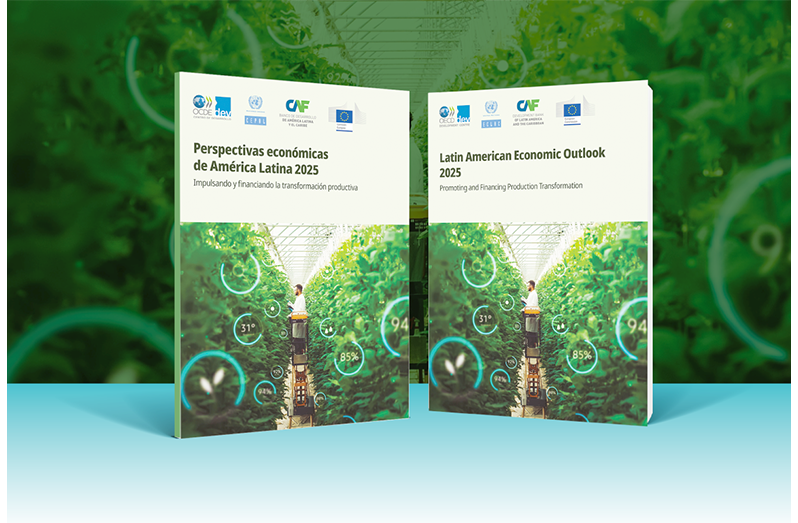THE Economic Commission for Latin America and the Caribbean (ECLAC), in collaboration with the Organisation for Economic Co-operation and Development (OECD), the European Commission, and the CAF–Development Bank of Latin America and the Caribbean, will present the Latin American Economic Outlook 2025 (LEO 2025) on November 10 in Santa Marta, Colombia. The report, titled “Promoting and Financing Production Transformation,” provides a detailed roadmap for strengthening the region’s productivity, sustainability, and inclusivity amid evolving global economic and geopolitical realities.
The LEO 2025 examines how Latin America and the Caribbean can overcome structural barriers that have led to stagnant productivity and limited growth. It calls for the modernisation and scaling up of Productive Development Policies (PDPs) — strategic frameworks that combine public and private efforts to transform economic sectors and drive innovation.
The report outlines that effective PDPs must be collaborative, engaging governments, the private sector, academia, and civil society; strategic, focusing on priority sectors; and localised, with strong action at the subnational level.
ECLAC’s Executive Secretary, José Manuel Salazar-Xirinachs, underscored the urgency of this transformation:
“Strengthening productive development policies is even more vital given the new realities of global geoeconomics. Without these policies, the region risks remaining trapped in a low-growth cycle with serious consequences for economic and social development.”
Although several countries — including Brazil, Chile, Colombia, Costa Rica, the Dominican Republic, Mexico, and Uruguay — have made strides in implementing PDPs, the report notes that investment levels remain low. On average, Latin American and Caribbean nations allocate just 0.5% of GDP to productive development, compared to 3% in OECD economies. Meanwhile, tax exemptions equivalent to 4% of GDP reduce fiscal space for innovation and growth initiatives.
OECD Secretary-General, Mathias Cormann, emphasised the need for deep structural reforms:
“Ambitious reforms are needed to boost labour productivity, tackle high informality, and expand value-added exports. Strengthening regional connectivity, developing capital markets, building skills, and mobilising domestic resources will unlock sustainable, inclusive growth.”
FINANCING TRANSFORMATION THROUGH SUSTAINABLE INVESTMENT
The LEO 2025 highlights the growing role of green, social, and sustainable bonds, which reached US$164.4 billion in 2024 — up from just 9% to 27% of total bond issuance in four years. The report also points to rising Foreign Direct Investment (FDI), now averaging 2.8% of GDP, mainly in renewable energy, digital infrastructure, and high-tech industries.
To accelerate transformation, the report calls for greater mobilisation of public and private capital, stronger development banks, and the expansion of innovative financing instruments to drive industrial and technological diversification.
The publication underscores that productive development policies can serve as a foundation for enhanced co-operation — both within the region and with global partners. It urges the expansion of collaboration between Latin America and the Caribbean and the European Union under the Global Gateway Investment Agenda, which promotes technology transfer, sustainable finance, and the development of local production chains.
CAF Executive President, Sergio Díaz-Granados noted that:
“Latin America and the Caribbean is a reliable, like-minded partner that offers what Europe needs — while the EU provides the capital, technology, and expertise to develop high value-added production chains.”
European Commissioner for International Partnerships, Jozef Sikela, added:
“The region holds strong potential for sustainable, digital, and inclusive growth. Through the EU-LAC Global Gateway Investment Agenda, we are working together to deliver quality investments that bring tangible benefits to our peoples.”
The LEO 2025 report will be officially launched during the Business Forum of the Summit of Heads of State of Latin America, the Caribbean, and the European Union (CELAC–EU) in Santa Marta. The event will gather leaders from government, international organisations, financial institutions, and the private sector to discuss strategies for investment, sustainability, and productive innovation.
Since its inception in 2007, the Latin American Economic Outlook series has served as a key reference for analysing the region’s development challenges and fostering policy dialogue between Latin America, the Caribbean, and Europe. The 2025 edition proposes a long-term vision linking productive development policies, sustainable finance, institutional capacity, and international co-operation — with an emphasis on territorial development and social inclusion.



.jpg)








